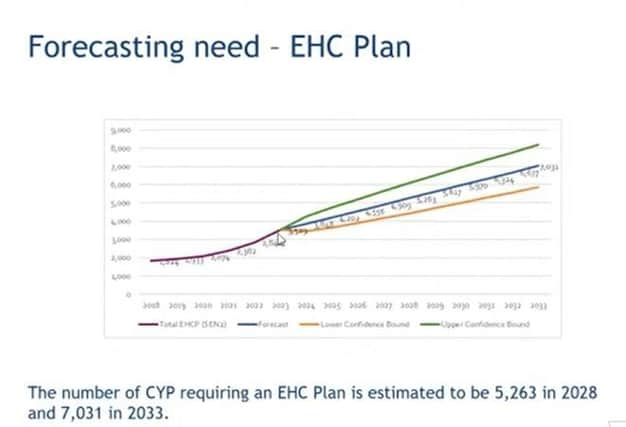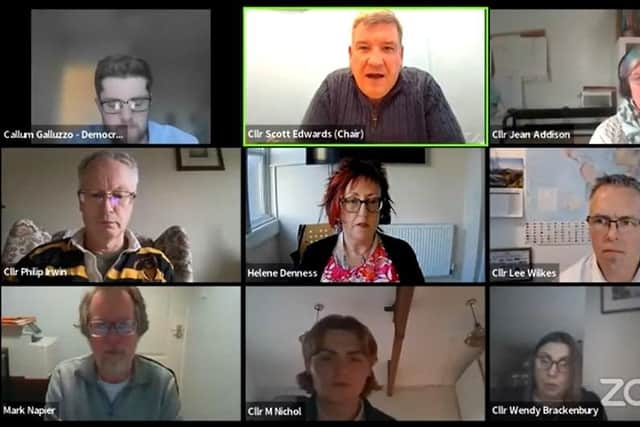Number of children with an EHCP in North Northamptonshire set to double in next decade, says key report


The number of children needing the highest level of special educational needs intervention is set to double in the next ten years.
A key report commissioned by North Northamptonshire Council suggests that those children with an Education, Health and Care Plan (EHCP) will rise to more than 7,000 by 2033.
Advertisement
Hide AdAdvertisement
Hide AdIt also predicted that the rate of growth will be much higher in girls than boys, because of improving methods of diagnosis.


Mark Napier from the Centre for Public Innovation warned the council’s Future Communities Executive Advisory Panel at its online meeting last night (Tuesday, February 6) that there would be ‘no flattening’ in the numbers of children requiring their support.
Numbers up 39 per cent in five years
The respected research organisation was asked by the council to come up with an assessment of the number of children with Special Educational Needs and Disabilities (SEND) in North Northamptonshire to help them forecast what services might be needed in the future.
Their report found that, of the 10,109 children in our area with SEND, 6,580 receive the basic level of help known as SEND Support and 3,529 have an EHCP. The total has gone up by 39 per cent since 2018, when there were 7,824 children with SEND.
Advertisement
Hide AdAdvertisement
Hide AdThose with an EHCP need a higher level of specialist educational intervention which may place a pressure on the council’s finances.
Mr Napier said that the proportion of those children with an EHCP had increased significantly.
“The difference is EHCP used to make up about 25 per cent of that total demand,” he said.
"It’s gone up to 29 per cent over a five year period which is quite a significant shift.”
Advertisement
Hide AdAdvertisement
Hide AdJust over half of those needing help are under ten. About 62 per cent of those needing SEND support are boys, and 73 per cent of those with an EHCP are boys.
Under-diagnosis in girls
Mr Napier added: "There’s an entrenched view that these things are more tending to occur in boys. If you look at the literature that’s not necessarily that case.
"So actually one of the key conclusions from the report is there’s an under-diagnosis in girls and young women because there’s a real stark anomaly in the data.”
His report predicts that by 2028 there will be 7,990 children needing SEND support, rising to 9,255 in a decade.
Advertisement
Hide AdAdvertisement
Hide AdAnd those with an EHCP plan are predicted to rise to 5,263 by 2028 and 7,031 by 2033.
"It will double over ten years,” said Mr Napier. “There’s no drop in demand. There’s no flattening. You’re looking at year-on-year growth on the numbers of children who will require an EHCP plan.”
He also said that 76 per cent of autism diagnoses were in boys.
"We’re clearly seeing a gender imbalance,” he said.
"I think there’s a tendency to over-diagnose or better diagnose these conditions in boys, so potentially that rate of increase is where we get better and better at diagnosing girls.
Advertisement
Hide AdAdvertisement
Hide Ad"They’re better at masking it. Girls exhibit a different way. My strong suspicion is that the rate of growth will be among girls."
Mr Napier also said that people from Asian backgrounds were under-represented.
He added that between the end of primary and secondary school, the attainment children with SEND needs in North Northamptonshire dropped off when measured against their peers around the country.
He recommended range of mitigating measures are put in place to make sure the the council is ready for the increase.
‘Going digging for it’
Advertisement
Hide AdAdvertisement
Hide AdCllr Dr Philip Irwin (Con, Croyland), who works as a supply teacher, told the meeting: “It was very interesting about the Asian population being under-represented. It’s established the most educationally successful people are those whose families are very supportive of education.
"In many parts of Asia education is very highly regarded. Can that explain the difference that you noted and if so it’s a bit of a waste of time to go digging to try to increase the numbers who get SEND support because there may not be that level of SEND need there.
"I recognise girls may be as liable to autism as boys. They do present differently. Where you see children under-achieving because of it, they’re mostly boys.
"I wonder there’s a risk that we’re going digging for it.”
Mr Napier said there was no evidence to suggest there was a difference in presentation of need in any ethnic group.
Advertisement
Hide AdAdvertisement
Hide Ad“We need to assume in the absence of evidence that it’s equal in all ethnicities until there’s evidence that proves otherwise,” he said.
"Similarly with autism, how young women manifest and present autism is different to boys.
"We’re not very good at understanding what that looks like in girls.”
Helene Denness, assistant director for public health in Northamptonshire, said: “When you read some of the literature on girls and young women it’s not that they don’t appear to be functioning more easily in the classroom, it’s that that carries a weight for them,
Advertisement
Hide AdAdvertisement
Hide Ad"Being able to mask doesn’t necessarily mean they will have the opportunity to thrive.”
£13.8 million needed to plug gap
Cllr Lee Wilkes (Con, Raunds) asked about the financial impact on the council.
He said: “This is a marked increase showing no sign of slowing up. What’s the budget gap looking like year on year?”
Chair Cllr Scott Edwards (Con, Wicksteed) conceded that NNC’s higher needs block budget is currently overspent by £10m, although this is at a lower level than many councils.
Advertisement
Hide AdAdvertisement
Hide AdNNC’s assistant director of education Neil Goddard said NNC would have to find and extra £13.8m extra in five years to fund the extra EHCPs, at an average cost of about £8,000 each.
‘Absolutely disgusted’
Mum Julie Heron has two autistic children. One of them has had to be removed from education while she fights through the courts for an EHCP plan.
Following the meeting, she said she was ‘disgusted’ by the comments made by Cllr Irwin. “The stress, worry, pressure now working etc is a lot on my family but I have had to do what's best for my child,” she said.
“With this in mind I was absolutely disgusted by comments made by Cllr Irwin.
Advertisement
Hide AdAdvertisement
Hide Ad“Cllr Irwin suggests that ‘Asian’ families do not have as many EHCPs for their children as they as they have a better attitude towards education.
“This is suggesting to me as a non-Asian parent I do not, and it’s my attitude that’s the issue not my daughter’s desperate mental state. It is also shockingly stereotyping a whole continent of people.
“He then goes on to say do not ‘dig’ deeper- suggesting to me that if ‘Asian’ people are not looking into EHCPs then let’s not rock the boat and have them looking at them.
“I have no idea of the reasons for the difference but I would be worried that in fact the community he is speaking about feels they cannot apply and deal with things differently.
Advertisement
Hide AdAdvertisement
Hide Ad“He also makes reference to girls in education and how as a supply teacher he saw autistic boys ‘falling behind’ and not girls.
“Girls present different to boys and studies show they make their symptoms and then suffer mentally and emotionally. By high school age they are often in crisis.
“I find his comments socially unacceptable, stereotypical and very damaging.”
